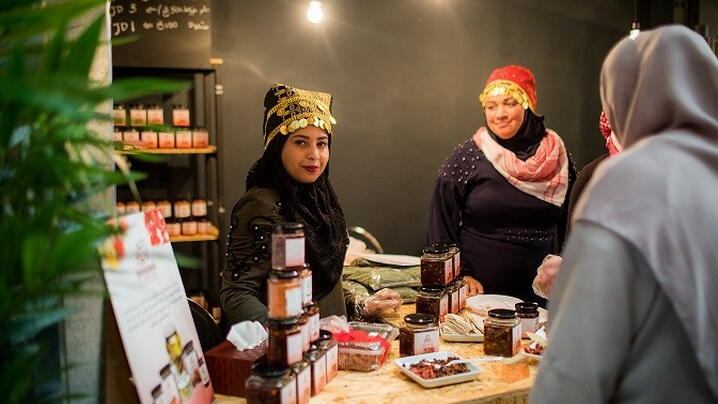
by Kara Elser, assistant program manager, and Lindsay Lucas, program manager, ICMA
With a total of 24,500 visitors over seven days, the Jordan Food Week (JFW) concluded successfully on July 24, 2018. For a week, chefs, restaurants, culinary schools, and local food producers showcased their best products. Jordanians from throughout the kingdom, as well as tourists and expats, tasted delicious, locally produced artisanal foods and international dishes with a Jordanian twist at the Hanger in Ras El Ain in Amman.
ICMA Employee Aleen Sawalha designed and managed the operations of Jordan Food Week. This festival was one of the most significant "demand-driven" activities of the Project’s lifetime. Aleen is currently working at the USAID Jordan Local Enterprise Support Project (USAID LENS) field office as a senior economic specialist. During the past nine years, she has accumulated diverse experiences from national and international agencies specializing in local economic development. Throughout the past four years, Aleen has been responsible for planning and managing different technical activities and public events that highlight the project vision in supporting local business and economic growth.
We interviewed Aleen to hear more about her experiences in implementing a first-of-its-kind festival in Jordan with great success.
Q: What is Jordan Food Week?
A: It’s a week-long festival that promotes the quality, diversity, and culture of Jordanian food. Its goal is to create behavioral shifts in the market and revolutionize perceptions of Jordanian cuisine and the artisanal food processing industry, which consists primarily of home-based businesses (HBBs). Jordan Food Week is a transformative moment for the food processing industry.
Q: Tell me more about the purpose of Jordan Food Week. What did you hope to accomplish by organizing the event?
A: These were a few of our objectives:
• Creating new, sustainable, private-sector linkages between restaurants, retailers, and artisanal producers.
• Increasing demand for locally made HBB food products.
• Demonstrating to the HBBs the potential for expanding and growing beyond an HBB.
• Offering the first major consumer preference and demand-side survey.
• Leveraging and kick-starting such international food movements as the organic, Fair Trade, slow-food, and buy local campaigns in Jordan.
Through the event, USAID LENS significantly increased the profile of and demand for Jordanian, artisanal food and created new perceptions about Jordan food among local buyers, Jordanians, and internationals.
Q: Why do you think it was so important for USAID LENS to support this event?
A: Since 2014, USAID LENS has focused on two key economic sectors (food processing and adventure tourism) to drive up the volume and value of transactions in local communities. The project has recognized that communities have extensive resources and skills in the food processing and adventure tourism industries. With the right investment and technical assistance, both industries have the potential to become drivers of economic growth.
In Year 5 of the project, with the foundations laid, USAID LENS made a major push to drive up demand and improve the overall recognition of local artisanal food producers and their capacities. In this regard, the Jordan Food Week was designed specifically to boost the profile, match-make local artisanal food producers with major buyers, and drive consumers to put greater pressure on retailers and the government to support the artisanal food production industry.
Q: How did you get involved in managing Jordan Food Week?
A: In general, I have a passion for arranging events, and my supervisor, Edmund Morris, believed that I could deliver a great event that would meet our objectives. With the support of different departments, the results were tremendous.
Q: Why was the decision made to focus on food rather than another type of event, say a music festival?
A: USAID LENS determined that local communities have extensive resources and skills in food processing, and with the right investment and technical assistance, this industry can become a driver of economic growth. Therefore, USAID LENS has supported HBBs, starting from the point of their purchasing source materials and goods.
Q: What do you consider to be the most important outcomes of this first year of Jordan Food Week?
A: The most important outcome was that artisanal food producers had the opportunity to increase their revenue by selling their products during the food week. Additionally, people who attended the Jordan Food Week became more familiar with their products. HBBs had the opportunity to make business deals with restaurants to start including their products in their dishes. Now, Jordanians are more aware of our traditional food, which was relatively unknown.

Aleen Sawalha, senior economic specialist, USAID LENS
Related Resources
Improving Climate Resilience in the Dominican Republic. This 2018 article looks at work ICMA is doing in the Dominican Republic regarding climate resilience as part of the CityLinks Partnership.
CDI Newsletter: SURGE Project Update. This 2018 blog post provides updates on ICMA's SURGE project in the Philippines.
Strengthening Community Participation Worldwide. In another 2018 article, the focus is on Kosovo where ICMA will be working on Issues like local government service delivery and resident engagement.
New, Reduced Membership Dues
A new, reduced dues rate is available for CAOs/ACAOs, along with additional discounts for those in smaller communities, has been implemented. Learn more and be sure to join or renew today!
